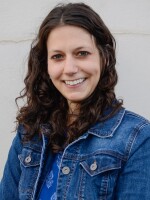This is part of Essential Voices, a series of interviews with people confronting COVID-19.
Hospitals across the Midwest have adjusted policies for the coronavirus crisis -- including limiting patient visitors. That can be especially hard when a patient is near death, and friends and relatives want to share a final goodbye. Dr. Lauren Graham speaks about those emotional moments at Grinnell Regional Medical Center in Iowa.
In addition to handling local COVID-19 cases, her hospital can get patients from a neighboring county that has seen outbreaks at a long-term care facility and meat-packing plant.
This transcript has been edited for clarity and length.
I am an internist in Grinnell. I'm the medical staff president and I don't know what my other title is, COVID queen, COVID coordinator. I don't know, we've joked about quite a few. I think medical director of our COVID-19 response.
I think the good news is that where we are in Grinnell has not been terribly affected yet.

But we are a regional medical center so we're seeing kind of most folks that we see are from Tama County. So there's a big outbreak to the north of us in a county that doesn't have a medical facility. So some of its residents come here. And that's interesting because I think one of the things we're learning about this and need to be learning quicker is that, you know, this isn't a local response. It's a regional response. It's a state response. It's a national response, and how do we all work together?
I think that the harder things were is seeing patients who don't do well. In a way you, you know, we healthcare workers are all accustomed to death in some respects. But this seems to be a lot harder or more of it or more concentrated or it's just different in some way.
Hear more stories on COVID-19 from the America Amplified initative
One big change with COVID is our visitor policy right? So families aren't really coming in, especially when folks are really sick or there's really hard decisions. I mean, of course we'll talk to them on the phone and they can FaceTime or Skype, but it is just different if they're here and they see what's happening. And you just feel for families.
Right now in the parking lot behind me out the window, there is, I think, about 10 cars full of family members of an older gentleman who's in the hospital and actively dying. And, you know, they have one family member that can come in at a time. And they've traded off between two of them to try to limit exposure and limit their protective gear and all of that. And they've been so gracious in following the rules with that. But the whole family slept in their cars in the parking lot overnight because they were afraid he was going to pass away and they wanted to be here, even if here is in the parking lot. And that's just so hard. Those families can't be here so hard that we can't really let them be here in that way.
That public health goal of keeping people less infected supersedes the goal of getting to be with your loved one when they are in the worst way, and all those moments you would always want people to be together. And I think that personally is the most gut-wrenching for me.
Yes, at the end of the day, I don't want my family to get [COVID-19]. And and yes, the hours are long. And yes, the the challenges are different. But you went into [medicine] to take care of people, and at least if you can't fix them, you can at least give them hope and comfort in the end. And one of the main ways you do that is by letting them be with the people you love -- they love -- and we just can't do that in the same way.
And I think that is just probably the hardest thing that I didn't anticipate. You know, this is not how any of us want this to be. And those are the policies and we don't want to spread infection. But at the end of the day, it just doesn't feel right. And that's hard.
This story was produced by Side Effects Public Media, a news collaborative covering public health.
Side Effects, WFYI and Indiana Public Broadcasting are asking Americans about health issues, as part of America Amplified: Election 2020. The public media initiative, funded by the Corporation for Public Broadcasting, uses community engagement to inform and strengthen local, regional and national journalism. Follow on Twitter at @amplified2020.
If you have a personal story to share from the front lines of this pandemic, wherever that may be, email health@wfyi.org.







